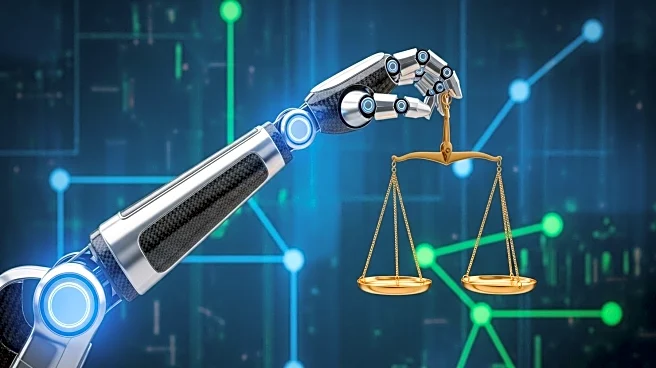What's Happening?
The integration of artificial intelligence (AI) into the legal profession is reshaping the role of general counsel (GC) and the operations of legal departments. AI is not only enhancing productivity and cost efficiency but is also redefining the strategic functions of legal teams. The technology enables the preservation and operationalization of institutional knowledge, reducing the risk associated with the departure of key legal personnel. AI tools are creating a dynamic corporate intelligence that captures the reasoning behind legal decisions, thus embedding knowledge within the organization. This transformation allows legal teams to retain critical expertise and facilitates the onboarding of new hires by providing immediate access to institutional knowledge. The role of general counsel is evolving from passive consumers of legal services to active architects of the legal profession's future.
Why It's Important?
The adoption of AI in legal departments has significant implications for the legal industry and its stakeholders. By embedding institutional knowledge within AI systems, legal teams can mitigate the risks associated with employee turnover and enhance their strategic capabilities. This shift could alter the dynamics of the lateral talent market, as firms may no longer lose critical knowledge when key personnel leave. Additionally, AI's ability to synthesize and apply legal knowledge could lead to more efficient and strategic decision-making processes, potentially increasing the value and influence of general counsel within organizations. As AI continues to transform the legal landscape, firms that embrace these changes may gain a competitive advantage, while those that resist may struggle to keep pace.
What's Next?
As AI continues to integrate into legal operations, general counsel will need to navigate the challenges and opportunities presented by this technology. Legal departments may need to redefine their strategies and processes to fully leverage AI's capabilities. The legal services market could see a shift towards more value-based billing models, as AI enables greater efficiency and transparency. General counsel will play a crucial role in shaping the future of legal services, determining which firms thrive in this new landscape. The ongoing transformation will require legal professionals to balance technological engagement with traditional legal judgment, ensuring that AI enhances rather than replaces human expertise.
Beyond the Headlines
The integration of AI into the legal profession raises ethical and cultural considerations. As AI systems become more involved in legal decision-making, questions about accountability and the boundaries of legal judgment will need to be addressed. The reliance on AI could also impact the traditional hierarchy and culture within legal teams, as the technology democratizes access to knowledge and decision-making processes. Legal professionals will need to adapt to these changes, embracing a more collaborative and technology-driven approach to their work. The successful integration of AI will depend on the ability of legal teams to balance innovation with the preservation of core legal values and ethics.











